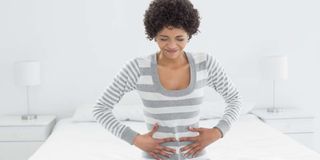Doc, could pain in my abdomen be linked to coil?

An IUD (intra-uterine device) or coil can change position causing pain and heavy bleeding. PHOTO | FOTOSEARCH
Dr Flo,
I have been using a coil for family planning and it has worked well for the past three years. However, of late, I have been experiencing a sharp pain in my lower abdomen as well as discomfort in the soles of my feet. I suspect that perhaps the coil has moved. Is this possible? Nelly
Dear Nelly,
An IUD (intra-uterine device) or coil can change position causing pain and heavy bleeding. For the position of the coil to be checked, please visit a gynaecologist for examination and an ultrasound scan. It can be repositioned or removed, if necessary. The gynaecologist will also check for any other causes of the abdominal pain like problems in the reproductive or urinary tract or the intestines, and these will be managed appropriately. The pain in the sole of the foot is a separate problem, which may be due to inflammation of the soft tissues in the sole. It is more likely to occur if you are overweight, if you stand or walk for long durations of time or if you have flat feet or a high foot arch. Wearing shoes with poor arch support also contributes to the problem. To manage it, reduce the pressure on your feet by reducing the walking and standing. You can stretch and massage your feet before getting out of bed in the morning and after being on your feet for long. Wear shoes with good arch support and a cushioning sole or use heel cushions. Pain killers also reduce the pain and inflammation. If the pain persists despite these, see an orthopaedic doctor for further examination and treatment.
Dr Flo,
I am a 24-year-old man from a village in Tharaka-Nithi County and I have always woken up every morning with cold-like symptoms. One of my noses is usually blocked due to my allergy to dust, which is unavoidable here at home. Is there any cure for this and to help me wake up to a good morning?
John
Dear John,
You most likely have allergic rhinitis. What this means is that your body’s immune process reacts quite strongly to dust, strong
smells, pollen or cold. These are called triggers and they cause your respiratory system to overreact, causing the sneezing and runny nose. When the nose is stuffy, it may also cause a headache. Allergic rhinitis is usually in the genetic make-up of a person, which means it can be passed from parents to children and it cannot be completely cured. It is also associated with other allergy conditions like allergic skin rashes, allergic cough, recurrent itching of the eyes (allergic conjunctivitis) and asthma. A person may have one or a combination of several of these allergies.
The condition cannot be cured, but it can be controlled by avoiding the triggers like cold, dust, strong smell, pollen and smoke. For some people, the symptoms disappear after they move to an area where there are no triggers. You can also take anti-allergy medication, maybe every night before you sleep. You may also benefit from a nasal spray, which can be prescribed by an ENT (ear, nose, throat) specialist.
Dr Flo,
I have been having a recurring yeast infection for some time now. I always take antibiotics which work for a while then the infection recurs. I have taken all hygiene measures, but nothing seems to be working. Please help.
Barbie
Dear Barbie,
It is normal for all women after puberty to have a vaginal discharge. It is a mixture of fluid and cells that help to keep the vagina clean and moist and to prevent infection. The appearance changes depending on the menstrual cycle and can also be affected by exercise, stress, use of hormonal medication and sexual arousal. The discharge may vary from white to clear, and from watery to thick, at different times of the cycle. It is also normal to have a brown or bloody discharge just before, during or after your periods, or sometimes in between your periods (spotting). If there is abnormal colour (yellow, green, some- times white), itching, a foul smell, or thick, chunky discharge, then most likely there is a vaginal infection. The infection may be caused by fungi (like candidiasis), bacteria or other organisms. Because of the recurrence, it would be advisable to have a high vaginal swab (HVS) and culture done to see if there is infection or not. If it is proven to be candidiasis, you can be put on antifungals for several consecutive months (about six months) to prevent recurrence. Any other infection will be treated appropriately. For some people, there is no identifiable reason for recurrence of candidiasis, however, it may occur due to a low immunity or due to diabetes or long- term use of steroid medication. Any infection can be transmitted, though it is not common to transmit candidiasis from a female to a male partner. Should a partner be infected and not treated, then they can spread the infection back to you. Observe good hygiene, wipe from front to back, avoid using dirty toilets, wear cotton underwear, avoid wearing very tight pants and sleep without underwear as often as possible. Also, use anti-bacterial/antibiotic medication only when absolutely necessary. If you get candidiasis every time you use antibiotics, it may be advisable to take an anti-fungal every time you complete a dose of antibiotics.
Send your medical questions to [email protected] for free expert advice


